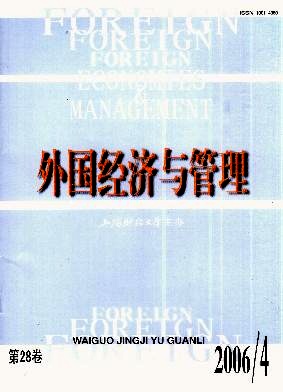团队授权目标及其实现策略研究
外国经济与管理 2006 年 第 28 卷第 04 期, 页码:15 - 20
摘要
参考文献
摘要
本文运用集合理论形象地描述了实现能力、任务和权力三者匹配的授权TPA目标模型,并运用缺口理论探讨了授权供需“平衡-不平衡-新的平衡”的循环过程,推断出只有团队能力提升的比率达到权力供给系数与权力需求系数之比,才能实现能力、任务和权力的完全匹配。最后,通过对团队能力发展的预测,提出了拉式授权策略和推式授权策略缓解权力供需缺口的思路,以便团队实现完全自主管理。
[1]Sirkin H L.The employee empowerment scam[J].Industry Week,1993,(10):58-64.
[2]Barner R.Enablement:the key to empowerment[J].Training and Development,1994,48(6):33-36.
[3]Desmond J Leach,Toby D Wall,and Paul R Jackson.The effect of empowerment on job knowledge:an empirical test in-volving operators of complex technology[J].Journal of Occupational and Organizational Psychology,2003,76:27-52
[4](美)默雷尔(Murrell,K L)等著(2000);杜丁丁译.有效授权[M].北京:企业管理出版社,2001:10.
[5]Conger J A,and Kanungo R N.The empowerment process:integrating theory and practice[J].Academy of ManagementReview,1988,13(3):471-782.
[6]Neilsen E.Empowerment strategies:blancing authority and responsibility[A].In:S Srivastra(Ed.).Executive power[C].San Francisco:Jossey-Bass,1986:78-110.
[7]Fisher K.Leading self-directed work teams:a guide to developing new team leadership skills[M].New York:McGraw-Hill,Inc.,1993.
[8]Russell A Matthews,Wendy Michelle Diaz,Steven G Cole.The organizational empowerment scale[J].Personnel Re-view,2003,32(3):297-318.
[9]Martin Schaurhofer,and Markus F Peschl.Autonomy:starting point and goal of personal and social change:a construc-tivist perspective on knowledge management in empowerment processes[J].Kybernetes,2005,34(1/2):261-277.
[10]Cook,S.The cultural implications of empowerment[J].Empowerment in Organizations,1994,2(1):9-13.
[11]Sandra Jones.Employee rights,employee responsibilities and knowledge sharing in intelligent organization[J].Em-ployee Responsibilities and Rights Journal,2004,14(2/3):69-78.
[2]Barner R.Enablement:the key to empowerment[J].Training and Development,1994,48(6):33-36.
[3]Desmond J Leach,Toby D Wall,and Paul R Jackson.The effect of empowerment on job knowledge:an empirical test in-volving operators of complex technology[J].Journal of Occupational and Organizational Psychology,2003,76:27-52
[4](美)默雷尔(Murrell,K L)等著(2000);杜丁丁译.有效授权[M].北京:企业管理出版社,2001:10.
[5]Conger J A,and Kanungo R N.The empowerment process:integrating theory and practice[J].Academy of ManagementReview,1988,13(3):471-782.
[6]Neilsen E.Empowerment strategies:blancing authority and responsibility[A].In:S Srivastra(Ed.).Executive power[C].San Francisco:Jossey-Bass,1986:78-110.
[7]Fisher K.Leading self-directed work teams:a guide to developing new team leadership skills[M].New York:McGraw-Hill,Inc.,1993.
[8]Russell A Matthews,Wendy Michelle Diaz,Steven G Cole.The organizational empowerment scale[J].Personnel Re-view,2003,32(3):297-318.
[9]Martin Schaurhofer,and Markus F Peschl.Autonomy:starting point and goal of personal and social change:a construc-tivist perspective on knowledge management in empowerment processes[J].Kybernetes,2005,34(1/2):261-277.
[10]Cook,S.The cultural implications of empowerment[J].Empowerment in Organizations,1994,2(1):9-13.
[11]Sandra Jones.Employee rights,employee responsibilities and knowledge sharing in intelligent organization[J].Em-ployee Responsibilities and Rights Journal,2004,14(2/3):69-78.
引用本文
陈建安, 胡蓓. 团队授权目标及其实现策略研究[J]. 外国经济与管理, 2006, 28(4): 15–20.
导出参考文献,格式为:





 6164
6164  0
0

